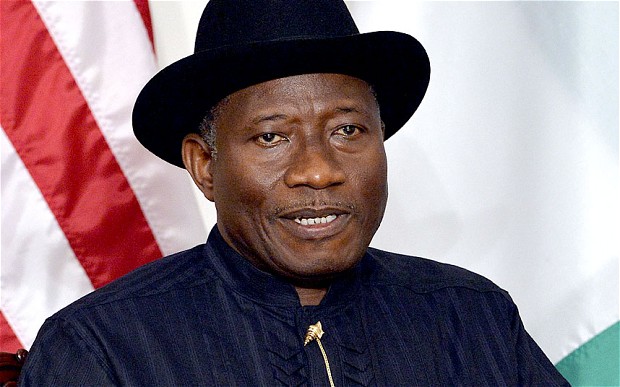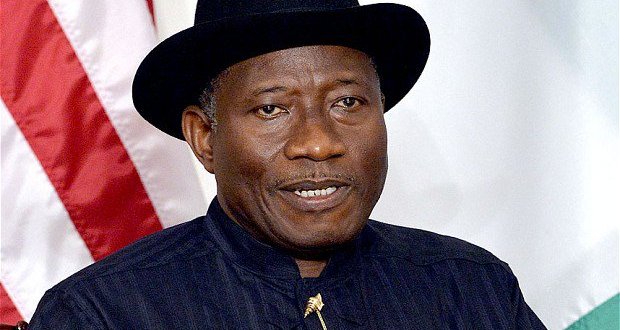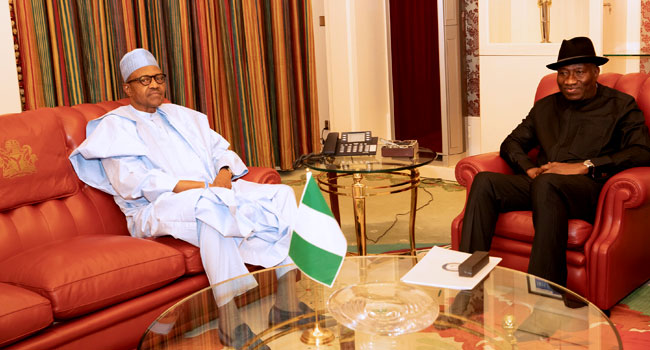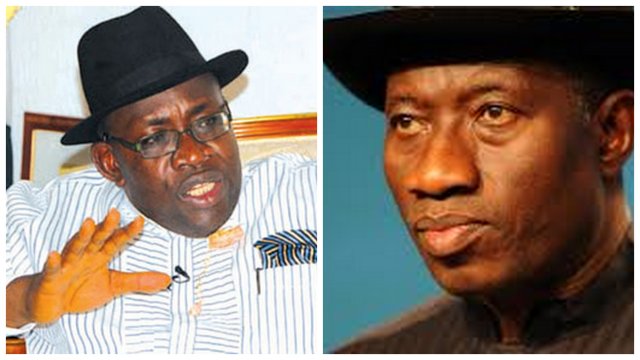Politics
My Transition Hours: Lessons from a humble leader
Published
5 years agoon
By
Olu Emmanuel
The book –My Transition Hours” launched by former President Goodluck Jonathan on Tuesday provides memoirs of the former President’s cooperation into the leadership structure of Nigeria, the betrayals, frustrations and resilience. Curiously, President Jonathan was not discouraged by the circumstances under which he lost the 2015 presidential election and has remained committed to nation building in the country.
John Dramani Mahama, former President of Ghana, 2012 -2017, who wrote the forward of the book, had declared: “There was no bitterness in him after he left power. He did not look back. He did not look down. Instead, he looked up and after looking up; he looked forward and went on pressing ahead. That forward movement has resulted in this work of statecraft and statesmanship of which I am privileged to write the foreword.
“Though there are many themes in this book, My Transition Hours, the theme that most excites me is the one on youth and the next generation.”
History records that Jonathan is the first President of Nigeria from the South-South; the first PhD holder in Nigeria to become President; the first Nigerian President to rise through the ranks from the position of Deputy Governor to Acting Governor, Governor, first Gubernatorial candidate nominee to become Vice President, Acting President and eventually President of Nigeria.
President Jonathan was Acting President in 2010, a period beclouded by political drama over the sickness of late President Umar Musa Yara’Adua, before his death. The political drama brought to the fore national questions on ethnic and geopolitical competition. However, the supremacy of the constitution cannot be scuttled by idiosyncrasies and predilections of political actors, and Jonathan became President of Nigeria in the ultimate denouement.
Some stakeholders in the Nigerian project were of the view that the former president is the villain in the book: badly treated by entrenched interest groups, treacherous party members, propaganda and hate-driven opposition and a badly constructed political ecosystem.
Jonathan won the 2011 Presidential election in which he defeated Gen. Muhammadu Buhari, presidential candidate of the Congress for Progressive Change (CPC).
In 2015, the Independent National Electoral Commission (INEC) declared that Jonathan lost the Presidential election to Gen. Muhammadu Buhari, candidate of the opposition All Progressives Congress (APC). He quietly called Buhari to congratulate him even before the announcement of the results was concluded. He further volunteered to cooperate with the incoming government to ensure a smooth transition on May 29, 2015.
To the consternation of many stakeholders in the country, Jonathan encountered caustic attacks under the Buhari administration. “He has been maligned, persecuted, harassed, intimidated, humiliated and insulted. His wife has been abused, maligned, criminally tagged and many of his associates have been labelled crooks and thieves,” a stakeholder decried.
It was further recalled: “In 2015, in the lead up to the general elections, Jonathan announced that his “ambition was not worth the blood of any Nigerian.” He signed a document to respect the outcome of the process. He kept his word. His successors have rewarded him with odium and abuse. They have done their best to discredit and destroy him.”
There are indications that the book, “My Transition Hours”, provides former President Jonathan opportunities to expose the ills of the last moments and afterwards, contrary to his public perception that he is a meek, gentle personality who lacks the guts to fight.
An Aide to the former President some traumatic memory: “after the 2015 elections, everyone deserted him; the Aso Rock Villa became a ghost town. Nobody picked our calls again.
“Giants in the corporate sector who used to beg for access to President Jonathan were reportedly now on the Buhari side. The President was left with just his main body, that is – his innermost circle of aides.
“We saw some of the people who called President Jonathan their brother and friend, on the Buhari side less than 24 hours after the election was decided. They were laughing and grinning! It was a painful moment for us. That was the real “Transition Hours” and that was when President Jonathan started threatening that he will write a book on his “Transition Hours”.
Former President Jonathan was considered to have chosen the right moment to go public with his traumatic experiences and change the narratives that most of the things said about him were fake news.
It was noted: “He insists that he did not abuse power as Nigeria’s President. He argues that every negative thing that has been said about him is an attempt to give him a bad name in order to hang him. He argues that “real strength is power under control”.
Jonathan clarified: “This book is not my biography, as that will come later. This book reveals how I used power as a shield in the service to our nation and God.”
Jonathan maintained that power should never be abused. He responded to the provocative issues relating to fuel subsidy, Boko Haram, “Stealing is not corruption,” governance, national development and others.
The former President revisited the major criticisms of his administration; he may not have provided hard facts but he talks back.
It was noted that a former President of Nigeria did say that he was badly treated and that he became a villain because he came from a minority part of the country.
It was observed that Jonathan stated that “the idea of “one Nigeria” does not exist because we are a divided country. He refuses to pull punches. Nobody is spared.”
In hi8s postulation on “Politics and Patriotism: The Fuel Subsidy Dilemma”, the former declared that “politics in Nigeria and some other African nations is conducted like primitive war”. His major reference is the battle over fuel subsidy in 2012. He argued that the protests over the fuel subsidy proposals were “politically motivated.”
On “The Chibok School Girls Affair;” The Governor of Borno state was accused of seizing an “opportunity to politicize an unfortunate incident”.
It was further indicated that “the APC also allegedly indulged in “psychological programming”, making President Jonathan look like a “villain”; he, however, rejects the labels.
Jonathan showed how the Barack Obama administration in the United States (US) was working against his administration; he provided evidence to prove his accusations.
President Jonathan expressed the conviction that the Chibok girls’ matter is an act of grand conspiracy because whereas he took every necessary step, the Governor of Borno State had a different agenda.
The former President also explained the controversial issue of stealing and corruption. It was declared that “the irony is that many of the initiatives now being adopted by the Buhari administration – Treasury Single Account, IPPIS and the BVN were all Jonathan’s initiatives.”
On “Power Struggle in Nigeria”, the former President decried what he called “strayed into power” and the attack of the majorities on the minorities.
Jonathan’s management of the 2015 “Presidential election campaign”; what transpired during the 2015 presidential election and how he personally took the decision to save Nigeria from a descent into imminent chaos, was remarkable.
At the end, former President Jonathan secured laudable credentials of an international statesman, enjoyed renowned goodwill among his peers before and after the 2015 election. He succeeded immensely in making Nigeria look good in the international community.
The former president recalled that he and his team were committed to using the 2014 National Political Conference and his personal commitment to promote the peace and stability of Nigeria. Unfortunately, the Buhari administration threw away the report of that national conference.
The former Media Aide to Jonathan remarked: “President Jonathan gave to Nigeria his very best. He was conscious of his humble beginnings and he wanted to make a statement. He was a poor man’s son who made it to the highest level in Nigeria. He was an embodiment of the Nigerian dream. But Nigerian politics is vicious and dirty…”
You may like
Trending

 Football6 days ago
Football6 days agoGuardiola advised to take further action against De Bruyne and Haaland after both players ‘abandoned’ crucial game

 Aviation1 week ago
Aviation1 week agoDubai international airport cancels flights as flood ravages runway, UAE

 Aviation1 week ago
Aviation1 week agoNCAA suspends three private jet operators for engaging in commercial flights

 Featured4 days ago
Featured4 days agoPolice reportedly detain Yahaya Bello’s ADC, other security details

 Comments and Issues6 days ago
Comments and Issues6 days agoNigeria’s Dropping Oil Production and the Return of Subsidy

 Education5 days ago
Education5 days agoEducation Commissioner monitors ongoing 2024 JAMB UTME in Oyo

 Business5 days ago
Business5 days agoMaida, university dons hail Ibietan’s book on cyber politics

 Education1 week ago
Education1 week agoOsun NSCDC solicits cooperation towards national assets protection







